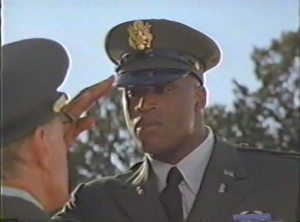
In 1993, the death of Superman caused an entire generation who’d grown weary of the character’s cinematic incarnations to perk up and start paying attention to comics. It’s the sad fact of our sad age that cynical marketing ploys (like killing off your flagship character just so you can bring him back to life) work more often than they fail. It certainly got me on board, and by the time Superman’s reappearence was all-but-upon-us I was loyally begging my parents for all four (at the time) of DC Comics’ Superman titles.
In an even more cynical ploy to hook we ignorant readers, the creatives behind Superman’s books trotted out four super powered pretenders to the throne, each of whom attempted to carry on the Man of Steel’s Never Ending Battle in their own, inept way. Steel was my favorite of the bunch because, unlike those three other sad sacks, he never pretended to be Back from the Great Beyond. We first met him as an anonymous construction worker whom Superman saved from a thirty-story fall. By way of a thank you, Big Blue instructed him to “live a life worth saving.” The rest is confusing comic book history.
Back in the real world, Hollywood spent the mid-to-late-90s scrambling to produce a Death (and Life) of Superman movie. Steel was originally intended as a tie-in to that film…which, for various reasons (most of them named Jon Peters), never got out of development hell. Just think: 1998 could’ve been a nerd year to end all nerd years. Instead of Armageddon vs. Deep Impact our wondering eyes could’ve seen Godzilla vs. Superman. And it still would’ve sucked.
For that I blame Joel Schumacher, whose Batman films drove the final nail into the Golden Age of Superhero pictures by bringing intentional camp back to the forefront of Hollywood’s so-called “mind.” If you’d like to know more, listen to Kevin Smith’s story of what happened during his involvement with (what was then called) Superman Lives.
Now that we know how Hollywood really works Steel should be no real surprise. Yet it is. The first thing you notice is Quincy Jones’ name right under the producer credits. That’s twenty-seven time Grammy Winner Quincy Jones to you, producer of Thriller, shepherd of Michael Jackson. He, like me, noticed that “Steel — and I don’t want to use that word ‘superhero,’ because he doesn’t fly or anything like that — represents a role model. Let’s just call him a ‘super human being.'”
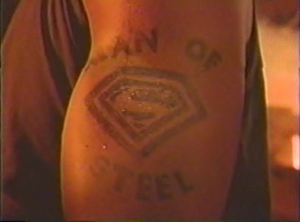
I have only one problem with that – in the comics Steel does fly. He couldn’t very well be the Black Superman if he didn’t. In fact, in the comics, he’s such a super genius he built an entire suit of powered armor in his slum apartment building’s basement, complete with a wrist-mounted rivet gun, cape, S-shield, and rocket boots. He’s the blue collar Tony Stark…without the alcoholism or Daddy Issues. What better idol could America ask for? And why did Quincy Jones begrudge us a pair of rocket boots?
Probably the same reason director Kenneth Johnson took away the cape. Thanks to Batman Forever, by the time Steel entered production, the word “superhero” was once again a pejorative descriptor associated with childishness and patented Jim Carry overacting. Perhaps Warner Brothers dangled the chance to do more Alien Nation TV movies in front of Johnson’s face until he relented and filmed this: a non-superhero superhero movie made with Quincy Jones’ money starring the basketball player who made Kazaam.
So…Shaquille O’Neal is Lt. John Henry Irons, U.S. Army, specializing in advanced weapons design. Lest we think John Henry is some kind of ironmonger, Kenneth Johnson’s script makes sure to underline his habit of building a non-lethal setting into everything. We meet Irons as he and his hot assistant Sparks (Annabeth Gish) show some of their babies off to the brass and a visiting Senator.
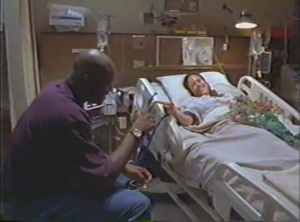
We also meet Lt. Nathaniel Burke (Judd Nelson!) among the military forces arrayed for this weapon’s test. Burke comes out as our Heavy by volunteering to show Senator Dead Person some of the “special” modifications he made to Irons’ design. This gross stupidity earns Burke, Sparks, and the senator face fulls of falling masonry. It also gives Shaquille his first good opportunity to ACT! Watch out for his plaintive, heavenward cry of “SPARKYYYYYYYYYYY!” It’s so overblown it’s damn near Shatnerian.
Shaq is no actor, and I’m not going to give him a pass just because he had run off and play in the ’96 Olympics during filming. But no one goes to Shaq movies to see Shaq act. The O’Neal apologists cry, “But he’s got screen chemistry!” Well, fuck O’Neal apologists; they’re stupid straw men I just made up so I could tell them to go fuck themselves. He’s seven-foot-one and over three hundred pounds. How could a camera not be captivated by him? Entire shots have to be blocked around keeping the top of his head in frame. Which reminds me: expect a lot of cross-cutting whenever Lt. Irons has to converse with the Lollypop Guild (by which I mean, the rest of us), lending the entire picture a decidedly made-for-TV feel.
After Irons’ testimony gets Burke drummed out of the service, Shaq tells the disgraced Lieutenant to get out of his face…except Judd Nelson would need a step ladder just to come up to Shaq’s chin, and no amount of scene-chewing evil can overcome the two’s unfortunate disparities in height…or overall acting ability. You know who you need to play someone like John Henry Irons? Carl Lumby, a great actor of stage and screen. And hey, he’s already played a less-robotic version of (basically) the same character in Dr. Miles Hawkins, the M.A.N.T.I.S.
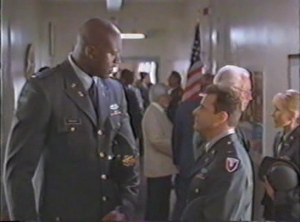
Since no one else remembers that show, I guess Irons must resign as well, having lost his stomach for iron mongering after he dug Sparks out of the rubble. She may never walk again…but at least her long road to recovery can provide inspiration for her better-abled companion. Everyone knows that’s why God puts disabled people on Earth, right?
“Where you headed?” Irons now-paraplegic Love Interest asks. “Home,” he says. Meaning L.A., of course. Both John Henry and Burke have connections in town so, while John visits the old ‘hood, Judd visits Big Willy Daniels (Steven Mattila). Just so happens Big Willy runs the local arms smuggling operation out of an arcade. The kind with video games.
Seriously. An arcade. A Batman Forever game features prominently in at least one establishing shot and I’m too lazy to look back and see how many other in-jokes are hiding in plain sight above Big Willy’s basement/gun warehouse. It’s so damn crazy…it just might work. I could see the Joker pulling something like this if the Joker did boring, normal things like run guns. Last I heard, actual international gun-runners live in South American castles surrounded by armed guards and hookers and possibly armed hookers. (Or is that Frank Miller’s house?) Which means Big Willy must be way low down on the International Arms Dealer Totem Poll. Look at him: no hookers, few guards, and an upstairs full of fucking kids. Why would Burke want to sell out to such a small-timer?
Then look at it from Big Willy’s perspective: some mook storms into your office and starts blabbing on about “the next generation of weapons” right in front of God and everybody. Whadda you do? You kick his ass to curb, right? A guy like that, he’s either a nut or a narc. “Sure, buddy. You survived your court marshal and they just let you walk out of there with a CD full of Uncle Sam’s finest heaters? Rii-iight.” Yet Big Willy invites the asshole downstairs for a guided tour of the whole operation. Smooth criminal, this guy.
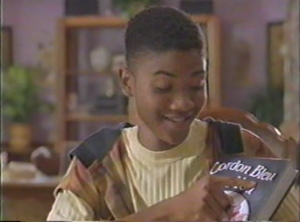
At least John Henry’s family isn’t as dumb. Irons’ little brother Martin (Ray J) is just smart enough to be our Odious Comic Relief…for the fifteen minutes of the film that actually feature him. Grandma Odessa (Irma P. Hall) will function as John Henry’s Aunt May, dispensing wisdom and suffering a home invasion by masked idiots after her son becomes a…what? I’m not supposed to use that word.
In the meantime, Grandma “wants to open up a restaurant and call it Black and Bleu,” selling an unholy fusion of Soul Food and hunte cuisine. That kind of thing must make chefs wake up screaming in the night, the taste clinging to their tongues. They’re banal, Disney-fied creatures, these Irons (“Ironses”?) oh-so wholesome. The cinematic equivalent of brussel sprouts. Considering how big a part the Irons family played in the first thirty-odd issues of Steel‘s comic, it’s especially sad to see them all eight of them squeezed down into two cliched, tension-killing characters. Damnit, they don’t even get kidnapped. What kind of superhero’s family are you people? Jeeze…
Meanwhile, at Big Willy’s Arcade and Arms, Burke’s constructing an armored HMMWV and a whole mess of superguns for local gangsters to field test. And what do they do? They pull the poorest excuse for a bank robbery since Dog Day Afternoon. Seriously, this is some damn sloppy work.
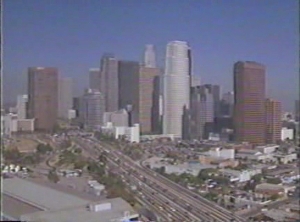
Yet Irons’ former commander, Col. David (Charles Napier, known around here as The Critic’s Duke Phillips) just can’t believe his guns have made it to the streets of L.A., no matter how hard John Henry hangs up on him. Because, you know, security is so tight around top secret weapons facilities. There’s just no way a disgruntled former employee could make a bazillion copies of all their best blue prints before they let him walk out the door.
Considering that‘s the kind of response he gets from official channels, Irons decides to roll up on the local hideout of “the Marks,” as Martin calls them. Dressed like refugees from a 2Pac music video, the Marks treat Irons with the same level of respect L.A. gangs are known for displaying towards random people who just walk in on them…though with a bit more restraint than usual, I’d imagine. No one mentions that Irons “should play for the Lakers or some shit,” despite the golden joke opportunity staring them all right in the face. They answer Our Hero’s polite inquiries with (regular, old fashioned) guns in the face. Irons tires not to notice, breaks one of their pool cues, and leaves in a huffy huff.
He visits a distraught Sparks at the VA Hospital in St. Louis where she’s gone to recover from her horrible accident by staring out a window and pouting. Rather than wait around for her to get over the trauma and all (or at least “enjoy” some government-funded physical therapy) Irons picks her up and carries her – wheelchair and all – out of the place, to the applause of their fellow vets.
I’m sorry, but…the hell? Why are you all applauding this obvious abduction in progress? Was Sparks just that much of a downer?
Whatever the case, Irons carts Sparks back to his Uncle Joe’s (Richard Roundtree! Oh, how the might have fallen) junkyard and reveals His Plan: “We make our own weapons to fight the ones in the streets.” Uh…huh…out of a junkyard? Apparently, yes. Then, after a scene where Sparks falls out of her wheelchair and has to decide whether or not to pick herself up – a scene that would’ve been honestly harrowing if it weren’t backed up by the most sentimentally manipulative music this side of a Spielberg movie – we get (glory be) a construction montage. Backed by the immortal Marvin Winas hit “Steel Yourself,” which one assumes our writer/director wrote especially for this moment in the film. As a songwriter, Mr. Johnson, I gotta say…you make a fine director.
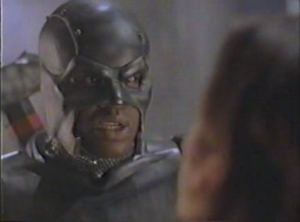
So Irons, Sparks and Uncle Joe construction a suit of powered armor for John to wear about town, the better to do battle with the murderous creations that defined his former life as a weapon’s maker. It’s a stark portrayal of one man’s bold stance against the forces of destruction and doom in the name of construction and…I’m just kidding. It’s a witless piece of shit that feels like every other film Kenneth Johnson ever made since the 1970s. Only, instead of aliens, we get Shaq as the Most Awkwardly-Dressed Superhero in All Existence.
In his long TV career, Johnson turned down chances to direct plenty of superhero films. The dialogue he farted onto the page for this shows his contempt, both for the source material and the film’s intended audience. At one point, Sparks actually says, “I laugh at danger,” if only to set Roundtree up for a bit of Odious Comic Relief. While inspecting Irons custom-made, weaponized hammer, Uncle Joe comments that “I especially like the shaft.” Ha ha! Double entendre! Will my sides ever heal up? Sparks doesn’t help things, telling John Henry, “Once I’ve explained this to you, I’m ready for a little field test.” Ha ha! Multiple entendre! I’m sure you are, honey.
Said field test, unfortunately, does not involve Sparks introducing John Henry to the wonders of a paraplegic’s upper body strength. Instead, Irons intimidates the Obligatory Purse Snatcher, doing his own version of the “I want you to tell all your friends about me” scene from Tim Burton’s Batman. Enthusiastically overreaching, he breaks up a gangland shoot-out, sensibly choosing to run from the L.A.P.D. once they (finally) show up. This just tips Burke (and everyone else in Iron’s life) off as to John Henry’s nocturnal activities (which amount to a whole lot of driving around in Uncle Joe’s van listening to the police scanner). A war of ex-military weapons designers begins, padding out the film with anemic, predictable story beats, as if both protagonist and antagonist suffered strokes while watching too many mid-90s superhero films.
First, Steel breaks up an attempted Super HMMWV robbery of the Federal Reserve (bet those reptilian, shapeshifting bastards never knew what hit ’em). Then Burke tires to frame John Henry for the robbery and, when that doesn’t work, kidnaps Sparks. John Henry escapes jail, suits up, and gets captured as soon as he breaks into Burke’s evil warehouse (go-to hideout of all made-for-TV villains). Everybody comes together for climactic shootout and a big explosion. The End.
The one surprise? Sparks’ Weaponized Wheelchair of Death, which is easily the coolest fucking thing in the whole movie. Gish is the coolest person in the cast, and she’s playing the best Oracle-analog we’d see until the coming of Dina Meyer in 2002’s Birds of Prey. But Oracle never needed to put lasers on her wheelchair to peak my interest, and calling Gish the best actor in the cast is faint, futile praise.
Steel isn’t just a bad film. It’s pure hokiness, set next to some of the most bloodless, boring, sanitized-for-your-protection violence this side of a G.I. Joe episode from the late-80s. Critics of the late-90s mistook this for a juvenile production, unwittingly insulting their juvenile readers. No self-respecting tweenages would dare debase themselves with something this insultingly stupid, especially not in a year that birthed The Fifth Element, Con Air, Starship Troopers, Spawn, and Men In Black. That’s more than enough crap to keep anyone busy. No one had time for Steel when it first debuted.
Even that’s kinda sad because I’d argue this is really a Bad Movie for the ages. It has the same problem Plan 9 had: ambitions far in excess of available talent. Its such a small film it feels like the generic template for a superhero film to follow, once its producers scared up the money. It’s like the pilot for a TV series that (thankfully) never saw the light of day, right down the running time. It could come in special packages marked, “Just add twenty minutes of commercials and serve.” It’s cinematic Ramen noodles.
Steel should’ve folded as soon as Tim Burton (or whoever) abandoned the idea of a Death and Life of Superman flick. It’s a film that ignored its own advice: “Eat the hotdog, don’t be one.” This is a hotdog film, made from shit the studio swept off the floor of its slaughterhouse and ran through a centrifuge that extracted everything vital and life-giving. One more example: Steel‘s version of a running gag revolves around John Henry’s inability to make free throws. At the end of the film, Steel and Martin find themselves trapped in a small room with a live grenade, paying off this running gag as only Steel can: by insulting the audience. All I’m saying is, that grenade must’ve had the longest fuse in the history of grenades.
Some kind of mind-altering malaise descended on Warner Brothers in the wake of Batman Returns. I choose to think of it as an intelligence-sucking cloud, preventing them from making good superhero movies. It’s a cloud we still live beneath today, and it’s dark shadow will only become more apparent as Warner Brothers continues to pawn off its productions to idiots who don’t honestly don’t give a crap about telling these stories to a mass audience.
With all that…it’s still better than Batman and Robin.
![]()


Hey thanks for linking to that Smith speech, it was goddamn hilarious. Also, I remember M.A.N.T.I.S.😉
You’re welcome. And thank the maker someone else is keeping Dr. Hawkins’ faith alive. If enough of us find each other, we can finally give those sycophantic New York Undercover fans a run for their money.